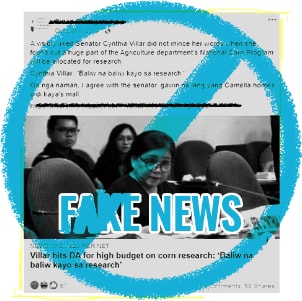Avoid fake news like COVID-19
WHEN a post is too good—or too bad to be true—check it out. When in doubt, check it out! Every man is entitled to his opinion, it is said, but not to his own facts.
Is it real? When you have no idea about the source of the news you saw on social media, check it out.
Since fake news seems here to stay, and fact checkers can’t keep up with the volume of wrong information each day, social media users are well advised to check any or every information that may run counter against general knowledge, established historical facts, or the news stories reported by known and legitimate newspapers, radio and TV stations as well as their online editions.
Avoid fake news like the plague. Like COVID-19. Learn how to spot fake news. Check first before believing. Check first before reposting.

Check the source of the story.
Source your news only from the known, legitimate media news organizations. Use news sources that are accountable for their content and that follow journalistic ethics and standards.
If the source is unknown, check it out. Don’t click it. It may lead you to a virus that can compromise your own account, which can give your personal details away. Be wary of your own safety.

When in doubt, do not share, do not repost.
Think twice about the story, especially if that story arouses strong emotions or extremely positive or negative feedback.

Even if you completely agree with the story, check it out.
Learn to recognize and check your own biases. News does not always come cold and innocuous.
But when news tries to profusely praise or disparage—people, public and private individuals, for or against your bias, check it out.

Never post fake news.
That is one thing the country does not need in times of pandemic.
What goes around, comes around. Anybody who shares wrong information may one day become a victim of his own trick. Of his own deceit.